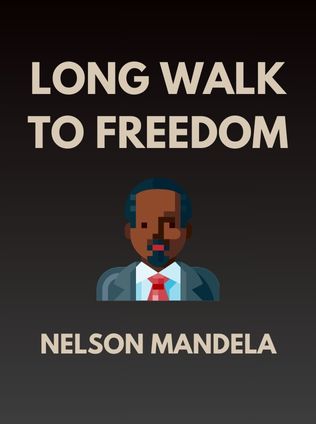
About the Author
Nelson Mandela is a name synonymous with the struggle for freedom and justice in South Africa and around the world. Born in 1918 in the small village of Mvezo, in Umtata, then part of South Africa's Cape Province, Mandela was originally named Rolihlahla, a Xhosa word meaning "troublemaker." As fate would have it, this name would come to characterize Mandela’s role as a disruptor of the status quo, a man who challenged the most deeply entrenched systems of oppression in his country.
Mandela was the son of Gadla Henry Mphakanyiswa, a chief of the Thembu people, which meant that leadership and responsibility were a part of his upbringing. After his father's death, Mandela was taken in by Chief Jongintaba Dalindyebo, the acting regent of the Thembu people, who played a significant role in Mandela’s early development. This adoption into the Thembu royal family provided Mandela with the opportunity to receive a formal education, which was rare for black South Africans at the time.
Throughout his youth, Mandela was deeply influenced by the traditional African values of his people, values that emphasized collective responsibility, respect for others, and the importance of consensus in decision-making. These values would later shape his approach to leadership and conflict resolution. However, Mandela’s exposure to the brutal realities of apartheid during his time in Johannesburg was equally formative. The stark contrast between the dignity of his traditional upbringing and the dehumanization of apartheid deepened his resolve to fight for justice.
Mandela's journey into education began at a Methodist school where he was given the English name "Nelson" by his teacher, a common practice intended to assimilate African children into British colonial culture. He continued his education at various institutions, including the prestigious University of Fort Hare, the only residential university for black Africans in South Africa at the time. However, his academic journey was marked by a growing political consciousness, leading to his involvement in student protests and ultimately his expulsion from Fort Hare.
Mandela's education was not limited to the classroom; the injustices he witnessed daily were a powerful teacher. The system of apartheid, with its laws enforcing racial segregation and economic exploitation, was designed to keep black South Africans in a state of perpetual subjugation. This system would become the primary target of Mandela’s lifelong struggle.
Main Idea
"Long Walk to Freedom" is more than just an autobiography; it is a powerful testament to the resilience of the human spirit in the face of overwhelming adversity. The book chronicles Mandela’s journey from a rural village in South Africa to becoming the country's first black president. It details his involvement in the anti-apartheid movement, his years of imprisonment, and his relentless pursuit of justice and equality. At its core, the book is a profound exploration of the themes of sacrifice, resilience, forgiveness, and the unwavering belief in the possibility of a better future.
Mandela's life, as recounted in "Long Walk to Freedom," serves as a powerful example of how an individual can influence the course of history through sheer determination and moral conviction. The book is not just a record of past events; it is an inspirational guide for those who seek to understand the complexities of social justice, the sacrifices required for change, and the power of forgiveness in the process of reconciliation.
Table of Contents
- Introduction
- Mandela's Early Life and Education
- The Birth of a Freedom Fighter
- Joining the African National Congress (ANC)
- The Sharpeville Massacre and Mandela's Arrest
- Imprisonment and the Struggle from Behind Bars
- The Road to Freedom
- Mandela's Presidency and Legacy
- Conclusion
Mandela's Early Life and Education
Mandela’s childhood in the rural village of Mvezo was steeped in the traditions and customs of the Thembu people. His father’s role as a chief instilled in him a deep sense of justice and leadership. Despite the simplicity of his early life, Mandela was acutely aware of the disparities between the lives of black and white South Africans, even as a child. This awareness grew as he moved to Johannesburg, where the brutal realities of apartheid became impossible to ignore.
Sign up for FREE and get access to 1,400+ books summaries.
You May Also Like
I Am Malala
The Story of the Girl Who Stood Up for Education and Was Shot by the Taliban
By Malala Yousafzai



















